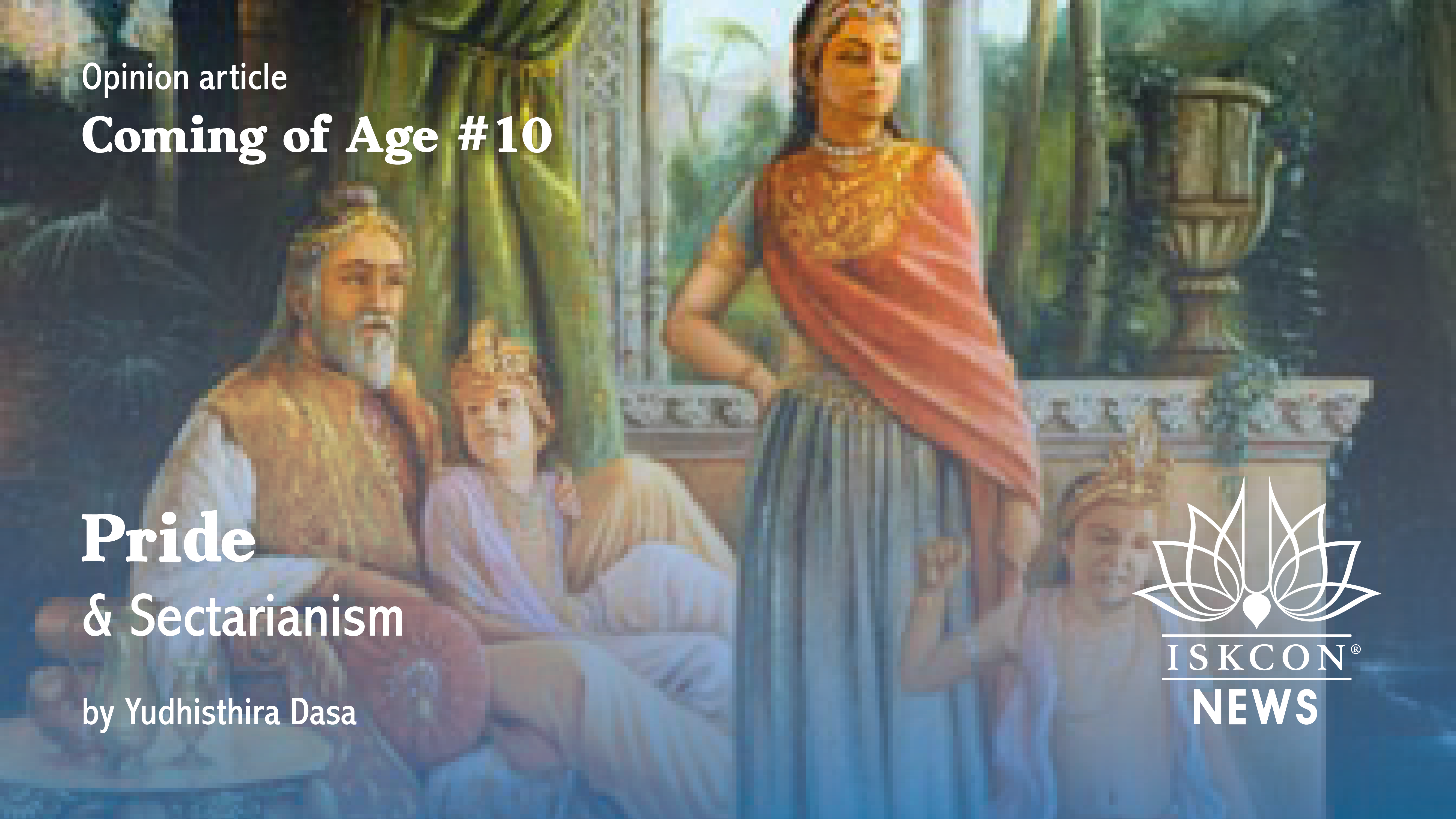Coming of Age #10 – Pride and Sectarianism
By Yudhisthira Dasa | Dec 01, 2023

Countless books have been written on both pride and sectarianism individually and also their often-insidious connection.
In the human condition, we are so deeply connected to our material egos (fragile as they are) that we instinctively want to be “right” and be part of whatever “right” means to us. This manifests itself in countless ways. Examples include wanting to win a family argument or fanatically cheering on our favorite sports team. Spiritual paths are often no different.
When I was first blessed to see Srila Prabhupada in 1975, not only did the chanting and prasadam (spiritualized vegetarian food) provide the “Kool-Aid” I was seeking, but the philosophy was so compelling that I entered the newcomer’s bubble within seconds. This was it. I found my path!
In those days, most of us came to believe that we had to protect ourselves from the highly anticipated negative influence of family and non-devotee friends. And, in the case of many, it may have been an important consideration. Many, if not most of us, further concluded that everyone in ISKCON was a devotee and misunderstood that everyone outside ISKCON was, therefore, a non-devotee. It created the “we” and “them” sectarian mentality that Srila Prabhupada and the previous teachers in disciplic succession never wanted or embraced at all. After all, there are so many branches of the Chaitanya Tree. Surely, “we” were not the only dedicated practitioners. And, there are nearly one billion (with a “B”) followers of the four primary Vaishnava sampradayas (disciplic successions).
What inevitably follows this ill-conceived sectarian belief structure is pride. While living in a protective bubble helps protect the fragile faith of the newcomer, staying in the bubble too long can also create lifelong problems. After all, if one wants to develop love of Krishna, we have also to learn to love all the parts and parcels of God and appreciate all of creation. The Bible reinforces this idea as well, “You are God’s work of art” (Ephesians 2,10).
And, in the Bhagavad Gita 5.18, “The humble sage, by virtue of true knowledge, sees with equal vision a learned and gentle brahmana, a cow, an elephant, a dog and a dog-eater (outcaste).” Srila Prabhupada writes at the start of his purport to this verse, “A Krishna conscious person does not make any distinction between species or castes.” His last sentence in the same commentary states: “The Supersoul is present in all bodies without distinction.” Let’s unpack this in the context of our daily lives.
The truth is that when someone joins the ISKCON “team,” they may feel extra and often exclusively special because of what can be called radical sectarianism. Our rhetoric reinforces it. While we may understand the non-sectarian essence of Gaudiya Vaishnavism and Krishna Bhakti, most of us still believe that, as members of ISKCON, we ARE the Chosen Ones! It creates quite a dilemma for so many, both inside and outside of ISKCON, since pride and love of God mix like oil and water. They don’t.
Examining this paradox objectively is challenging for most and can virtually shatter the faith of newcomers.
ALL PATHS LEAD TO ROME
This seemingly mundane adage “All paths lead to Rome” rings true if it helps us to better “see with equal vision” all life in the world. Some of the prerequisites on the path to developing love of God include humility, tolerance, patience, respect, and understanding, all in a non-judgmental state of mind. The phrase “Everyone follows My path in all respects” (Bhagavad-gita 4.11) is a wonderful reminder here.
SIMULTANEOUS ONE YET DIFFERENT
Lord Chaitanya gave us such a gift in this lesson of “Acintya bheda abheda tattva” (inconceivably and simultaneous oneness and difference). This transcendental perspective answers countless apparent paradoxes that can act as roadblocks and landmines that the human mind cannot digest otherwise.
FINAL WORDS
Srila Prabhupada compared this material world to dreaming at night. We may dream so many things, but when we wake up, we realize that the dream state is not real but temporary. It is the same way for souls in this world. Hence, our great acharyas (teachers by example) guide us to wake up to our eternally blissful spiritual or Krishna consciousness and never again forget who we are, namely, eternal and non-sectarian servants of God. In that consciousness, there is no room for this “ism” and that “ism,” but rather love, humility, and service fill our hearts completely.
















